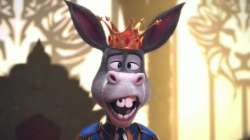Pakistani cinema goes global with 'The Donkey King'
'The Donkey King,' which has become the sixth most viewed film in Pakistan's history, has proved equally popular among children and adults.

The success of an animated comedy film, 'The Donkey King,' has attracted international attention to the movie industry of Pakistan, a country which normally makes headlines for violent terror attacks and religious extremism rather than culture and entertainment. The "accidental" director of the film, 41-year-old Aziz Jindani, told Efe news in an interview that he was proud of presenting a "soft face" to the country and added that it had a rich history of literature and film.
"Unfortunately, the negative cloud around the country has camouflaged all the good that we do," said Jindani, a business executive who got into animation after creating an advertisement series for a popular FMCG brand in the country.
"That's how I got fascinated by animation. I liked it so much that I decided I would make a movie on my own. I took a sabbatical and made this film," he said.
'The Donkey King,' which has become the sixth most viewed film in Pakistan's history, has proved equally popular among children and adults.
"There are two underlying themes which are universal. One is that it is an allegorical, metaphorical film, a political satire... Part two, I think it is because of the fact that we use a donkey as a protagonist. A donkey is a very likable kind of character, part of pop culture. It's a story about an underdog," Jindani explained.
The film -- released in Pakistan in 2018 and subsequently dubbed into seven foreign languages, including Spanish, Catalan, Russian and Turkish in 2019 -- has had its share of controversies, including allegations that it mocked Prime Minister Imran Khan, as some say the protagonist resembled him.
Jindani rejected these claims, insisting that the project had started in 2016, when the country had a different government. But he did accept that the film was inspired by the country's political scenario.
"Art imitates life. Pakistan is a very politically conscious country. There are lots of nuances or cues that we picked up from life. Everybody finds some connection with the story," the director said.
Despite the success of his first venture, Jindani does not see himself enjoying a career exclusively in filmmaking, as the industry remains small in the country.
"For 200 million people there are (just) about 140 screens and 62 cinemas," he lamented.
Jindani cited the strict censorship enforced in Pakistan in the 1980's as a major reason behind the decline of the film industry for three decades until the year 2000, from which it has yet to fully recover.
"There are not enough films because there are not enough cinemas and there are not enough cinemas because there are not enough films. And then there is not enough money. A cinema ticket in Pakistan almost costs the same as one in Spain," he said.
However, the animator is optimistic about the future of movies in the Islamic nation, which produces just 40-odd films per year.
"I think now a new age of Pakistani cinema is coming back again," Jindani said.
More Bollywood stories and picture galleries
For all latest news and updates, stay tuned to our Facebook page